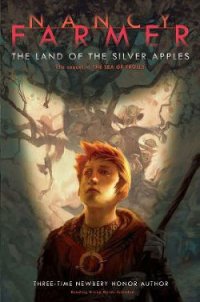Tehanu The Last Book of Earthsea - Le Guin Ursula Kroeber (серии книг читать онлайн бесплатно полностью .TXT) 📗
“Go on,” Tenar said. “I’m used to foreigners.”
That night as she lay going to sleep she entered again into the vast gulfs of wind and light, but the light was smoky, red and orange-red and amber, as if the air itself were fire. In this element she was and was not; flying on the wind and being the wind, the blowing of the wind, the force that went free; and no voice called to her.
In the morning she sat on the doorstep brushing out her hair. She was not fair to blondness, like many Kargish people; her skin was pale, but her hair dark. It was still dark, hardly a thread of grey in it. She had washed it, using some of the water that was heating to wash clothes in, for she had decided the laundry would be her day’s work, Ged being gone, and her respectability secure. She dried her hair in the sun, brushing it, In the hot, windy morning, sparks followed the brush and crackled from the flying ends of her hair.
Therru came to stand behind her, watching. Tenar turned and saw her so intent she was almost trembling.
“What is it, birdlet?”
“The fire flying out,” the child said, with fear or exultation. “All over the sky!”
“It’s just the sparks from my hair,” Tenar said, a little taken aback. Therru was smiling, and she did not know if she had ever seen the child smile before. Therru reached out both her hands, the whole one and the burned, as if to touch and follow the flight of something around Tenar’s loose, floating hair. “The fires, all flying out,” she repeated, and she laughed.
At that moment Tenar first asked herself how Therru saw her-saw the world-and knew she did not know: that she could not know what one saw with an eye that had been burned away. And Ogion’s words, They wi/I fear her, returned to her; but she felt no fear of the child. Instead, she brushed her hair again, vigorously, so the sparks would fly, and once again she heard the little husky laugh of delight.
She washed the sheets, the dishcloths, her shifts and spare dress, and Therm’s dresses, and laid them out (after making sure the goats were in the fenced pasture) in the meadow to dry on the dry grass, weighting down the things with stones, for the wind was gusty, with a late-summer wildness in it.
Therm had been growing. She was still very small and thin for her age, which must be about eight, but in the last couple of months, with her injuries healed at last and free of pain, she had begun to run about more and to eat more. She was fast outgrowing her clothes, hand-me-downs from Lark’s youngest, a girl of five.
Tenar thought she might walk into the village and visit with Weaver Fan and see if he might have an end or two of cloth to give in exchange for the swill she had been sending for his pigs. She would like to sew something for Therru. And she would like to visit with old Fan, too. Ogion’s death and Ged’s illness had kept her from the village and the people she had known there. They had pulled her away, as ever, from what she knew, what she knew how to do, the world she had chosen to live in-a world not of kings and queens, great powers and dominions, high arts and journeys and adventures (she thought as she made sure Therru was with Heather, and set off into town), but of common people doing common things, such as marrying, and bringing up children, and farming, and sewing, and doing the wash. She thought this with a kind of vengefulness, as if she were thinking it at Ged, now no doubt halfway to Middle Valley. She imagined him on the road, near the dell where she and Therru had slept. She imagined the slight, ashen-haired man going along alone and silently, with half a loaf of the witch’s bread in his pocket, and a load of misery in his heart.
“It’s time you found out, maybe,” she thought to him. “Time you learned that you didn’t learn everything on Roke!” As she harangued him thus in her mind, another image came into it: she saw near Ged one of the men who had stood waiting for her and Therru on that road. Involuntarily she said, “Ged, be careful!”-fearing for him, for he did not carry even a stick. It was not the big fellow with hairy lips that she saw, but another of them, a youngish man with a leather cap, the one who had stared hard at Therru.
She looked up to see the little cottage next to Fan’s house, where she had lived when she lived here. Between it and her a man was passing. It was the man she had been remembering, imagining, the man with a leather cap. He was going past the cottage, past the weaver’s house; he had not seen her. She watched him walk on up the village street without stopping. He was going either to the turning of the hill road or to the mansion house.
Without pausing to think why, Tenar followed him at a distance until she saw which turn he took. He went on up the hill to the domain of the Lord of Re Albi, not down the road that Ged had gone.
She turned back then, and made her visit to old Fan.
Though almost a recluse, like many weavers, Fan had been kind in his shy way to the Kargish girl, and vigilant. How many people, she thought, had protected her respectability! Now nearly blind, Fan had an apprentice who did most of the weaving. He was glad to have a visitor. He sat as if in state in an old carved chair under the object from which his use-name came: a very large painted fan, the treasure of his family-the gift, so the story went, of a generous sea-pirate to his grandfather for some speedy sail-making in time of need. It was displayed open on the wall. The delicately painted men and women in their gorgeous robes of rose and jade and azure, the towers and bridges and banners of Havnor Great Port, were all familiar to Tenar as soon as she saw the fan again. Visitors to Re Albi were often brought to see it. It was the finest thing, all agreed, in the village.
She admired it, knowing it would please the old man, and because it was indeed very beautiful, and he said, “You’ve not seen much to equal that, in all your travels, eh?”
“No, no. Nothing like it in Middle Valley at all,” said she.
“When you was here, in my cottage, did I ever show you the other side of it?”
“The other side? No,” she said, and nothing would do then but he must get the fan down; only she had to climb up and do it, carefully untacking it, since he could not see well enough and could not climb up on the chair. He directed her anxiously. She laid it in his hands, and he peered with his dim eyes at it, half closed it to make sure the ribs played freely, then closed it all the way, turned it over, and handed it to her.
“Open it slow,” he said.
She did so. Dragons moved as the folds of the fan moved. Painted faint and fine on the yellowed silk, dragons of pale red, blue, green moved and grouped, as the figures on the other side were grouped, among clouds and mountain peaks.
“Hold it up to the light,” said old Fan.
She did so, and saw the two sides, the two paintings, made one by the light flowing through the silk, so that the clouds and peaks were the towers of the city, and the men and women were winged, and the dragons looked with human eyes.
“You see?”
“I see,” she murmured.
“I can’t, now, but it’s in my mind’s eye. I don’t show many that.’’
“It is very wonderful.”
“I meant to show it to the old mage,” Fan said, “but with one thing and another I never did.”
Tenar turned the fan once more before the light, then remounted it as it had been, the dragons hidden in darkness, the men and women walking in the light of day.
Fan took her out next to see his pigs, a fine pair, fattening nicely towards autumn sausages. They discussed Heather’s shortcomings as a swill-carrier. Tenar told him that she fancied a scrap of cloth for a child’s dress, and he was delighted, pulling out a full width of fine linen sheeting for her, while the young woman who was his apprentice, and who seemed to have taken up his unsociability as well as his craft, clacked away at the broad loom, steady and scowling.




